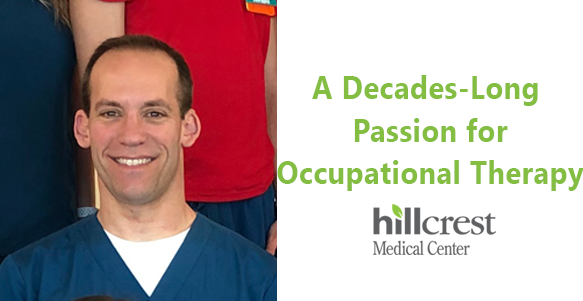
Every April, the American Occupational Therapy Association, Inc. highlights Occupational Therapy month to recognize an important profession that helps people across the lifespan participate in the things they want and need to do.
Curtis Marti has been an occupational therapist for 23 years, 17 of those spent at Hillcrest Medical Center. He still lights up at the chance to talk about his work and his patients.
“I love the variety of different patients we get to work with here,” Marti said. “I may have a 22-year-old mother of three that has a stroke or a traumatic brain injury, or I may have a 93-year-old with a hip fracture, and anything in between.”
In physical therapy, a patient gains strength, mobility and balance. Occupational therapists then apply those skills to help patients regain the ability to drive, prepare a meal, get dressed and more.
“You’re working on the skills of doing meaningful activity again,” Marti said.
Since Marti began practicing, the occupational therapy field has experienced some changes, including the length of time therapists work with hospital patients.
“Now, there are so many other options once a patient has been medically stabilized,” Marti said. “In the past, we would work with them here in the hospital for an extensive amount of time and see them through a majority of their recovery. Now, we get them medically stabilized as soon as we possibly can and then send them on to the next appropriate care person to be able to complete the healing process.”
With obvious passion in his voice, Marti shared how special it is that he is able to give his patients hope. He is in a position to help patients in difficult chapters of their life learn to navigate through them, so he approaches each patient with a certain mantra.
“To be in this place where you feel a significant and overwhelming sense of loss and sometimes depression, if I can jump in there and let you know, ‘Hey, this is not the end of the story; you are going to be able to get back to doing things again,’ that’s really what I bring to every patient’s room. I really do love what I do every day.”
This means a patient may need to learn to do things in a different manner, but Marti shows them it can still be done.
“I focus on giving them that sense of hope that through hard work and vigilance and focus they can, in fact, return to doing a good measure, and sometimes all, of what they were capable of doing before,” Marti said.
He added that being able to advocate for his patients’ needs is another rewarding aspect of being an occupational therapist. He plays a part in the early recovery for a patient, working with physicians to determine the most appropriate next level of care.
“I just want to show them this isn’t the end of the road; this is just going a different route, but we can still get to that destination.”
